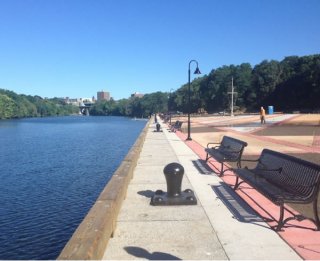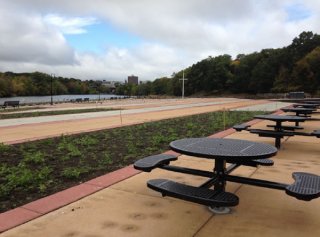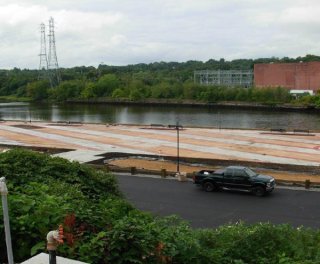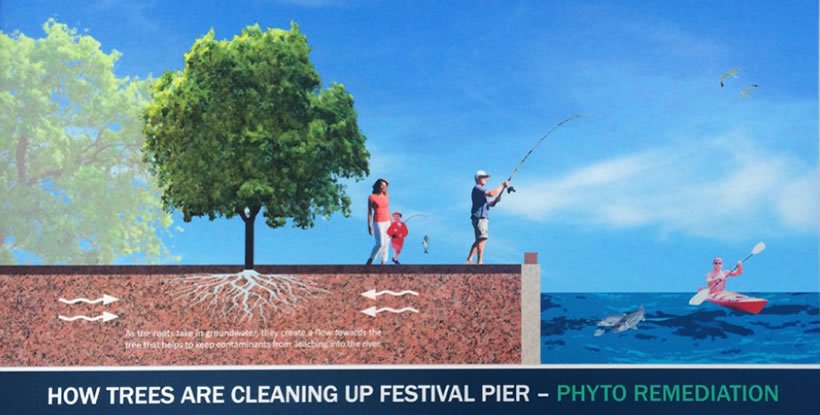R1 Success Story: Festival Pier (State Pier), Pawtucket, R.I.

EPA Grant Recipient:
City of Pawtucket
Grant Types:
Assessment, Cleanup
Former Uses:
State Pier
Current Use:
Public Event and Outdoor Riverfront Recreation Park
Download Success Story:
Festival Pier (State Pier) Pawtucket, R.I. (pdf)
Rhode Island is known as the "Ocean State", benefits from more than 400 miles of shoreline, but in Pawtucket, and throughout northern Rhode Island, there are few opportunities for salt water fishing and boating, as the Pawtucket River was largely inaccessible to the community. To create more opportunities and provide public access and recreational amenities, the City redeveloped the former State Pier. The 5-acre riverfront site has been redeveloped into "Festival Pier", a public event and outdoor riverfront recreation park. Festival Pier is now a key asset for Pawtucket, providing fishing, boating, and other recreational opportunities for residents.
Priming the Property for Redevelopment
Prior to redevelopment, the site was covered with broken asphalt and patches of scrub vegetation. Despite its condition, State Pier was heavily used by both fishermen and the City for festivals which led the City to rename the site as Festival Pier. For past years, the Pier has hosted the Chinese American Festival and the Taiwan Day Festival, which attract over 6,000 visitors from the New England region. The pinnacle of the Chinese American Festival is the Dragon Boat Race, when teams from all over the East Coast compete in the boat races.
The redevelopment of Festival Pier came because of years of visioning and planning. Beginning in 1994, Mayor Robert Metivier established the Pawtucket Riverfront Commission with the directive to review the entire riverfront and make recommendations for its revitalization. In January 1997, the Commission undertook a public participation outreach effort to involve citizens in the discussion of the existing riverfront and the development of a plan for its reuse. This intensive public process resulted in the 1997 Pawtucket Riverfront Plan, which recommended the use of the Pier for riverfront recreation and open space. As a result of this recommendation, in 2000 the Pawtucket Redevelopment Agency donated the land to the City of Pawtucket for this public use. The City then searched for funding sources to clean up and redevelop this site into a safe and healthy public space for all residents to enjoy.

Starting in 2005, the Rhode Island Department of Environmental Management (RIDEM) dedicated over $92,000 of its EPA Brownfields funding to conduct the necessary assessment and cleanup planning activities at the site. In 2009, the City of Pawtucket received a $200,000 cleanup grant from EPA, as well as additional cleanup funding from RIDEM, to clean up the Pier. With funding from the John H. Chaffee Blackstone Valley National Heritage Corridor Commission, the City of Pawtucket was able to prepare a Master Plan for the site. This project leveraged over $2 million.
"Festival Pier is a success for Pawtucket. The Pier is one of only two places within the City where residents can access the river. Pawtucket, working with RIDEM and the EPA, cleaned up the site and transformed it into a beautiful community resource, used by fishermen, boaters and for festivals".
Susan Mara,
City of Pawtucket
Today

The community engagement process supported by the EPA cleanup funding helped further the utility of the site design. For instance, Festival Pier is able to accommodate handicapped fishermen. The City coordinated with an affiliation of local anglers who utilize the site and participate in its maintenance, including a number of elderly and disabled individuals. Because of their request, the City agreed to add more parking to the site plan in proximity to the fishing areas.
Additionally, remedial action for this project included the use of green remediation, in the form of phytoremediation. With fifty-two quaking aspens planted in different areas of the site, phytoremediation uses these special plants to clean contaminant compounds that are in the soil and groundwater. Tiny microscopic organisms called microbes live in the soil and breakdown the contaminants. Tree roots accelerate the microbes' action by getting more oxygen into the soil and by supplying nutrients to the microbes through their roots (see image below). The trees and other landscaping also provide shade and create a more park-like setting. The cleanup has been completed, and with improvements to the parking area and the reconstructed boat ramp, the park is now open for the community.

For more information:
Visit the EPA Brownfields website at www.epa.gov/brownfields or contact Jessica Dominguez, 617-918-1627, dominguez.jessica@epa.gov.
